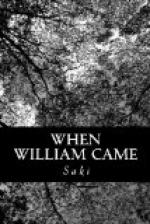Ronnie shrugged his shoulders.
“I would take things tragically if I saw the good of it,” he said; “as matters stand it’s too late in the day and too early to be anything but philosophical about what one can’t help. For the present we’ve just got to make the best of things. Besides, you can’t very well turn down Gorla at the last moment.”
“I’m not going to turn down Gorla, or anybody,” said Cicely with decision. “I think it would be silly, and silliness doesn’t appeal to me. That is why I foresee storms on the domestic horizon. After all, Gorla has her career to think of. Do you know,” she added, with a change of tone, “I rather wish you would fall in love with Gorla; it would make me horribly jealous, and a little jealousy is such a good tonic for any woman who knows how to dress well. Also, Ronnie, it would prove that you are capable of falling in love with some one, of which I’ve grave doubts up to the present.”
“Love is one of the few things in which the make-believe is superior to the genuine,” said Ronnie, “it lasts longer, and you get more fun out of it, and it’s easier to replace when you’ve done with it.”
“Still, it’s rather like playing with coloured paper instead of playing with fire,” objected Cicely.
A footman came round the corner with the trained silence that tactfully contrives to make itself felt.
“Mr. Luton to see you, Madam,” he announced, “shall I say you are in?”
“Mr. Luton? Oh, yes,” said Cicely, “he’ll probably have something to tell us about Gorla’s concert,” she added, turning to Ronnie.
Tony Luton was a young man who had sprung from the people, and had taken care that there should be no recoil. He was scarcely twenty years of age, but a tightly packed chronicle of vicissitudes lay behind his sprightly insouciant appearance. Since his fifteenth year he had lived, Heaven knew how, getting sometimes a minor engagement at some minor music-hall, sometimes a temporary job as secretary-valet-companion to a roving invalid, dining now and then on plovers’ eggs and asparagus at one of the smarter West End restaurants, at other times devouring a kipper or a sausage in some stuffy Edgware Road eating-house; always seemingly amused by life, and always amusing. It is possible that somewhere in such heart as he possessed there lurked a rankling bitterness against the hard things of life, or a scrap of gratitude towards the one or two friends who had helped him disinterestedly, but his most intimate associates could not have guessed at the existence of such feelings. Tony Luton was just a merry-eyed dancing faun, whom Fate had surrounded with streets instead of woods, and it would have been in the highest degree inartistic to have sounded him for a heart or a heartache.




